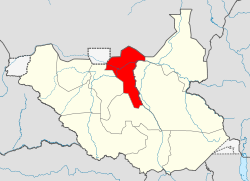Unity state prepares for national reconciliation process
By Bonifacio Taban Kuich
April 3, 2013 (BENTIU) – The Unity branch of South Sudan’s Peace and Reconciliation Commission has selected 15 community mobilisers from across the state to travel to Juba for a six week training programme to prepare for the nationwide peace-building process that is scheduled to begin in June.

The South was not a unified entity during the civil war with some groups changing sides on numerous occasions, often along ethnic lines. Since independence the young nation has struggled to stop the cycle of cattle raids between rival pastoral groups.
The country has also had to deal with various rebellions mainly based in Upper Nile, Unity and Jonglei, which Juba insists have been actively aided by the Sudanese government in Khartoum a continuation of the tactics it used during the civil war.
Such problems have led the South Sudanese government to create a national reconciliation process to encourage people to work towards peace and prosperity.
James Gatguok Makuong, the acting peace coordinator in Unity state, says the community mobilisers will play important roles promoting peace and national building.
“The intention is that these people will be community mobilisers so that they will disseminate the information that they received during the training to the community, how people reconcile among ourselves how people will change from previous lives and that is the intention of our commission here we work hard so that at least to change the life of our people to make peace sustainable to our communities”, Makuong said.
Makuong says the peace mobilisers were nominated from communities across Unity state and were selected based on a 500 word application to peace commission’s office in Bentiu.
Makuong said: “The recruitment that we have just made it was about 25 people and these 25 people and the selection was about 15 each person he has to bring along with him, his CV, his documents his qualification and also he should represent their own respective counties so it defend on the committees who selected there are some counties which they chose one and there some counties there are two-two”.
The national peace and reconciliation process was supposed to run in April but due to inadequate funding it has been postponed to June, to allow more time to mobilise resources and train those involved.
Daniel Kai Juach, one of selected peace mobilisers, who represents Payinjiar County told Sudan Tribune in a phone interview on Wednesday that the national peace reconciliation process will help bring an end to practices like cattle raiding, which he said he claimed to many lives since the Comprehensive Peace Agreement was signed in 2005.
On Easter Sunday South Sudan’s vice president, Riek Machar, calls on the South Sudanese people to implement the spirit of national reconciliation during his address to a Christian congregation at Nyakuron cultural centre in Juba.
The vice president urged Church leaders and civil society groups to fully participate in order to adopt for the country to modernize and become more prosperous.
South Sudan is one of the poorest countries in the world with some of the worst human development indicators.
(ST)
